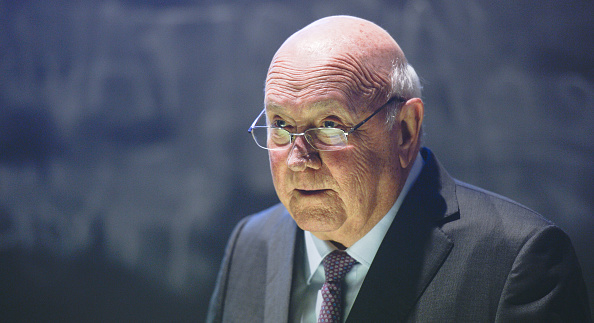
SA’s De Klerk pulls out of U.S. rights talk
South Africa’s last apartheid president, F.W. de Klerk, has withdrawn from a U.S. seminar about minority rights because he did not want to embarrass himself or his hosts in the current charged racial climate, his foundation has said.

Nobel Peace Prize winner and former South African President, FW de Klerk, addresses the Trinity College Law Society after he was presented with the Praeses Elit Award as a recognition of his key role in ending apartheid and his outstanding contribution to reconciliation in South Africa.
On Wednesday, 18 January 2017, in Dublin, Ireland. (Photo by Artur Widak/NurPhoto via Getty Images)
De Klerk was scheduled to speak on July 1 at an American Bar Association (ABA) virtual event on issues such as minority rights, racism and the rule of law.
But his participation unleashed a barrage of criticism from South African opposition parties and activists who called on ABA to cancel De Klerk’s attendance given his role in the apartheid-era security apparatus.
“The allegation that De Klerk was involved in gross violations of human rights is baseless,” the F.W. de Klerk foundation said in a statement.
“However, it appears unacceptable in the current super-heated racial climate that any leader from South Africa’s troubled past should be permitted to retain the slightest vestige of honour,” it said.
ABA confirmed De Klerk would no longer speak at the event.
The death of George Floyd under the knee of a U.S. police officer last month has triggered a wave of anti-racism protests around the world.
De Klerk’s foundation defended his legacy of helping South Africa’s transition from white minority rule to non-racial constitutional democracy and for being the only world leader to dismantle an existing nuclear arsenal.
But, almost thirty years after apartheid’s demise, De Klerk’s role remains highly contested in South Africa, one of the world’s most unequal societies where class and race issues constantly bubble under the surface.
Earlier this year De Klerk, who shared the Nobel Peace Prize with South Africa’s first democratically elected president Nelson Mandela, also faced a backlash when he told the national broadcaster he did not believe apartheid was a crime against humanity, as declared by the United Nations.






